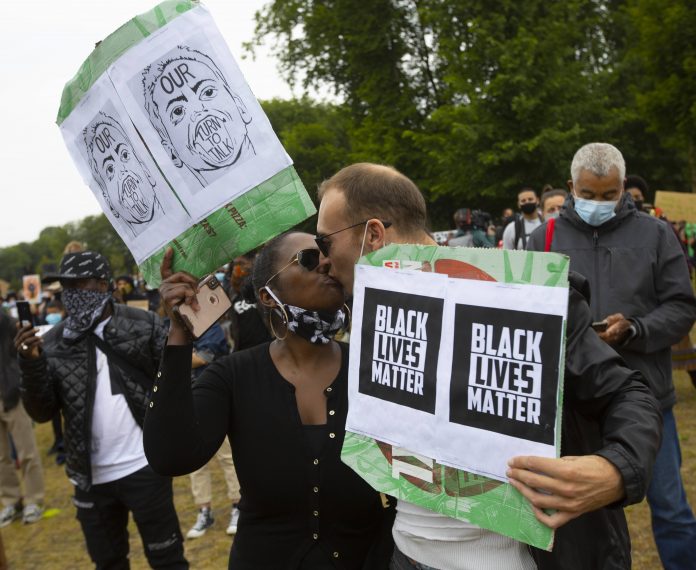
Thousands of people demonstrated Wednesday in support of the Black Lives Matter movement in a park in Amsterdam named for South African anti-apartheid icon Nelson Mandela.
It was the latest in a series of protests in Dutch cities that have followed the death of George Floyd in Minnesota on May 25 and the protests across the United States and the world that followed.
“We are here to hold up a fist against the global pandemic of racism,” protester Mitchell Esajas told the crowd at the peaceful event, where all the participants took a knee and raised a fist near the end.
Floyd, a black man, died after a white Minneapolis police officer pressed a knee on his neck even after he pleaded for air while lying handcuffed on the ground. He was buried Tuesday in Houston after a funeral service at which speakers predicted he will be remembered forever for changing history.
Public debate about racism, discrimination and historical links to the slave trade have intensified in the Netherlands since Floyd’s death.
A Dutch human rights organization called on the government Wednesday to appoint a coordinator to help tackle what it called “structural discrimination” in the Netherlands.
Dutch debate about race has often been dominated by a children’s character known as Black Pete, who is frequently portrayed by white people in blackface makeup during St. Nicholas festivities in early December.
The first speaker to address the Amsterdam demonstration wore a hoodie emblazoned with the words “Black Pete is racism.”
Last week, Prime Minister Mark Rutte said he had undergone a significant change in his views about Black Pete, although he maintained that he does not believe the character is racist.
“When I meet people — small children — with dark skin who say: ‘I feel unbelievably discriminated against because Pete is black,’ that’s the last thing you want,” Rutte said in a debate in Parliament.
“I expect that in the coming years almost no Petes will be black,” he added. “It’s a popular culture that changes over time and under pressure from debate in society.”
But Rutte has said he won’t ban Black Pete. Esajas wants more from the country’s political leader.
“As long as Mark Rutte does not take any action against Black Pete, we can say Mark Rutte does not care about black lives,” he said.
Debate also is on the rise about statues and other buildings and street names honoring historical figures linked to Dutch involvement in the slave trade. Some of the mansions lining Amsterdam’s historic canals — including even the official residence of the city’s mayor — were built for wealthy 17th century traders who held prominent positions in companies that bought and sold slaves.
On Sunday in the English port city of Bristol, demonstrators toppled a statue of a 17th-century slave trader, Edward Colston.



















